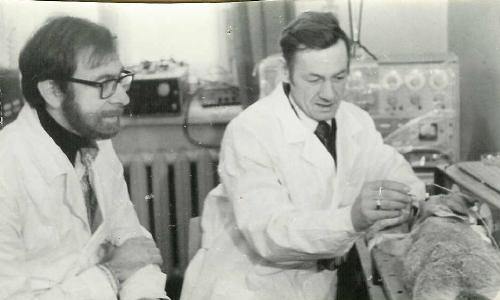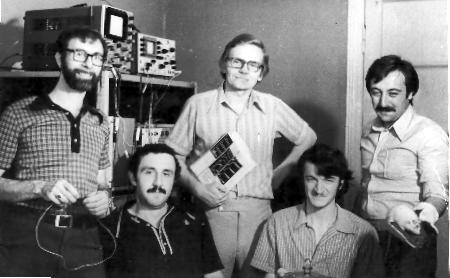Stories
The physiology of Nickolai Bernstein
Evolution of
the brain
and social behavior
Learning languages
* * *
I remember well the day I arrived in the Soviet Union in January 1976. The temperature was minus 35. At that point there is no need to specify Fahrenheit or Centigrade because they are both the same. Ice crystals hung in the air, danced and sparkled.
After a few weeks at the Intourist Hotel downtown, I moved to the Hotel Budapest, and later when that hotel was filled by delegates to the Communist Party Congress, I was once again moved to the Hotel Varshava. I walked everywhere, and ran everywhere for exercise, keeping a map of the city with the routes I had run so that I didn't run the same route twice. Moscow was my new home. I spoke no English, but only Russian, at first painfully, then more and more fluently as I memorized one hour of Pushkin's great poem, "Evgeny Onegin" and recited it whenever I could, putting the music of classical Russian into my head (see learning languages).
In the lab I was paired with Volodya (Vladimir Mikhailovich Badikov). He was a good communist, imbued with working-class consciousness and committed to the ideals of socialism. But looking back on it, he was very somber as if even then, well before the crash of the Soviet Empire, he was beginning to be concerned about the future for his country.
I used to go the the Finnish sauna ("finnskaya banya") with Volodya and Konstantin Viktorovich Sudakov, the head of the Institute. This was an all-day affair for men only. You sat around with only a towel in the hot sauna (about 200 degrees Fahrenheit, if you can believe it!) and then plunged into the cold swimming pool. And between times you ate salted fish, drank straight vodka and told anti-Semitic jokes. Fortunately, they had the good sense to have a chauffeur come to pick us up at the end of the day, as we were in no shape to drive! Not the best side of Russian culture!!! Which reminds me of the favorite show that got put on the television in that era, called "S'lyokem parum" - loosely translated as "have a good steam in the sauna!". In that show, the guy comes home in a taxi from the sauna and is so drunk he doesn't remember his address, so he tells the taxi driver just to drive until he sees a building that looks familiar to him. He sees such a building, pays and leaves the taxi. His key fits the building door, and his other key fits the apartment door. The apartment has a familiar layout, so he quickly disrobes and goes to bed. But there's one surprise: there's a strange woman in "his" bed. The "key" to the tale is that it is a reasonable caracature of the standardization of mass-produced Soviet architecture at the time where every building and apartment looked the same.
Our experiment was an ill-conceived study of drug effects on brain-stimulated behavior of rabbits. One advantage I found to working with rabbits is that they tolerate restraint; as a result, it was easy to do brain research on them without need for anesthesia. Since there were no fresh vegetables available in the markets, I used to share the rabbits' meals of carrots.
A particularly amusing moment was when someone came to the lab saying that there was a phone call for me from the Moscow circus, saying that they wanted to speak with the American expert on cat behavior. "What kind of cats are they talking about?" I asked. "Tigers," came the reply. "No," I said, "they must be mistaken. I am not an expert on cat behavior!"
I was amazed at how ill-equipped the laboratories were. I tried to design my own equipment and have it built, but the engineer was poorly trained, the technician was an alcoholic, and I found little expectation for good quality research. I discussed this with my friend Vladimir Khayutin, whose lab was well-equipped for cardiovascular research, and he told me that he "borrowed" his equipment from friends in the military where they had good materials and well-trained technicians. I did not realize at the time how significant this was, that the military was sucking the life-blood out of Soviet science and industry. Khayutin and I would go for walks in the park, as he was convinced that his house was bugged by the police. He told me of his horror at listening to a classmate at his high school reunion who was now a top air force general and the cavalier fashion in which they spoke of conducting a full-scale nuclear war with the United States.
Taking advantage of having several fellowships at the same time, I traveled extensively, including Leningrad, Novosibirsk, Estonia and Georgia. In Novosibirsk, I met two attractive girls from Barnaul on the Chinese border and, for them, I brought the latest news from the big city - Moscow! The relations with China had turned sour at that time. I made the acquaintance of a history professor who had worked in China. He showed me a photo of the Central Committee of the Chinese Party in the days when their was a Soviet-Chinese alliance and one by one he told of their disappearances and deaths.
In the Hotel Varshava I came to know Cuban and Sudanese revolutionaries who were there to work or to study at Patrice Lumumba University. It kept alive the interest in revolution that I had taken up in the 1960's. One of the Sudanese told me of executions by the government of his comrades. Once when I met with a high-level visiting American Communist, I asked him to find out about this and he returned from his meetings with a question rather than an answer: "Which one of the five competing Sudanese Communist Parties was he affiliated with?"
For one month I went to Georgia and helped set up a laboratory team under the direction of Tengiz Oniani to record from brain cells of cats during sleep. The team, later called David's Collective No. 1, included three young Georgians and a Hungarian who had come to Georgia when he heard I would be there. Although we did not make any major discoveries, the comradery of our work was very enjoyable. It served as a model of teamwork for many later experiences in other laboratories, in my own laboratory and in various political collectives which I founded or in which I worked.
I prepared the way for Nina to come over in May and do her Yale nursing thesis on Soviet health care. She had the privilege of going the rounds with the local doctors and a Russian interpreter to see the remarkably effective system by which medicine was delivered on a neighborhood basis. Years later, as I re-read this, I feel it necessary to add that although the Soviet healthcare system was never fully instituted at the time in the Soviet Union, and disintegrated after the fall of the empire, the system was recreated in Cuba and is now being exported by them to the rest of the world.
I had already been impressed by what I saw of medical education at the First Moscow Medical Institute where I was working. Most of the medical students were already nurses and approached medicine from a perspective of practical experience. They had a wonderful sense of humor. Once the professor was absent and left a tape recording of his lecture for the students. When he returned, the amphitheature (see photo) was empty of students by there was a tape recorder on the table with a note, "please speak into the microphone and we will listen to the tape." My colleague Sasha recalled having dangled limbs from their cadavers out the window when doing dissection in a lab located across the American embassy. One can imagine the rumors it sparked! But seriously, the Soviet healthcare system was organized on such good principles that it later served as a model for the healthcare system of Cuba which is now exporting doctors to the Third World.
The day Nina arrived, I had run far (perhaps 20 kilometers) to the end of the Metro line running east from Moscow, but when I went to the platform of the Metro to go back, I heard the woman guard for the station yelling at me "Molodoi chelovek, molodoi chelovek". I was in running shorts, not proper for "her" station (I was not yet runnning barefoot at that time). So she called the police and had me arrested for indecent exposure. I suggested that the police put me in a taxi and that I would pay when we got downtown to the hotel. The taxi driver was unimpressed when I told him they had arrested me for "indecent exposure." After all, recently he had taken someone home in his taxi whom the police had arrested for drunkenness in the Kiev railroad station. That person had been completely nude!

with Vladimir Badikov and one of our experimental rabbits

David's Collective Number 1 - (left to right):
myself, Lasha Gvetadze, Peter Molnar, Shota Maniavidze, Guram Beradze

|
I went to the Bolshoi Opera as well as the theatre and was fortunate to see Maya Plisetskaya dance Anna Karenina to the music of her husband, Rodion Schedrin - unforgettable!!! Somehow or other, Russian culture has penetrated deep into my soul! |

|
Coming from capitalism, I had to adjust my expectations. I looked for Russian classics in the bookstores but couldn't find them. Finally, one day, I saw all the classics on a special shelf above the checkout counter and started asking for them. "Only if you have the special coupon showing that you have collected scrap paper," said the clerk. I confronted my colleague Sasha Kotov. "What's wrong with socialism that I can't buy your own classic books?" He replied, "Tell me what you want and I will bring it to you."
"Why can't I buy it?" I continued to object. "Because they sell out the classics the first day they hit the shelves," he replied. "Why not make bigger editions," I continued. "They do," he replied again, "but people buy many at a time and they still sell out. Every family has many copies of all the classics in their homes. That's why I can bring you whatever you want."
Another example of different expectations: divorce. In the United States, a woman's income falls to less than half after a divorce, which makes many women stay in bad marriages. In the Soviet Union, on average, a woman's income increased after a divorce. Hence, the high rate of divorce in the Soviet Union was not necessarily a bad sign. In fact, the sexual life of Russians seemed much freer and more equal than that of Americans. Traveling in business hotels were an equal number of professional women and professional men, unlike the US where business hotels are filled with professional men and prostitutes.
I didn't give up, but used the classical capitalist argument. "So, if they buy more than they need, why not raise the price?" Sasha pondered for just a moment and gave me the clinching argument. "Which would you rather that people buy: alcohol or books? Isn't it better that children grow up with books in their house? Raising the price would just allow the Americans like you to buy the books and that doesn't interest us."
In 1981 I went back to Soviet Georgia to teach at the University for three months. Once again, I was impressed by the services offered by the socialist system.
 |
Stages
1986-1992
Fall of Soviet Empire
1992-1997
UNESCO Culture of Peace Programme
1997-2001
UN Intl Year for Culture of Peace